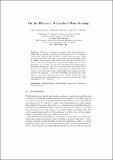On the efficiency of localized work stealing
Author(s)
Suksompong, Warut; Leiserson, Charles E; Schardl, Tao Benjamin
DownloadLeiserson_On the efficiency.pdf (276.5Kb)
PUBLISHER_CC
Publisher with Creative Commons License
Creative Commons Attribution
Terms of use
Metadata
Show full item recordAbstract
This paper investigates a variant of the work-stealing algorithm that we call the localized work-stealing algorithm. The intuition behind this variant is that because of locality, processors can benefit from working on their own work. Consequently, when a processor is free, it makes a steal attempt to get back its own work. We call this type of steal a steal-back. We show that the expected running time of the algorithm is T[subscript 1]/P + O(T[subscript ∞]P), and that under the “even distribution of free agents assumption”, the expected running time of the algorithm is T[subscript 1]/P + O(T[subscript ∞]lgP) . In addition, we obtain another running-time bound based on ratios between the sizes of serial tasks in the computation. If M denotes the maximum ratio between the largest and the smallest serial tasks of a processor after removing a total of O(P) serial tasks across all processors from consideration, then the expected running time of the algorithm is T[subscript 1]/ P+ O(T[subscript ∞]M). Keywords: Parallel algorithms; Multihreaded computation; Work stealing; Localization
Date issued
2015-10Department
Massachusetts Institute of Technology. Computer Science and Artificial Intelligence Laboratory; Massachusetts Institute of Technology. Department of Electrical Engineering and Computer ScienceJournal
Information Processing Letters
Publisher
Elsevier
Citation
Suksompong, Warut et al. “On the Efficiency of Localized Work Stealing.” Information Processing Letters 116, 2 (February 2016): 100–106 © 2015 Elsevier B.V.
Version: Author's final manuscript
ISSN
0020-0190